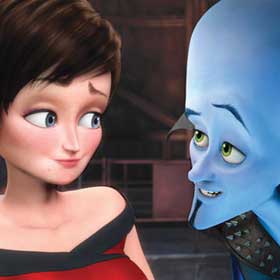Megamind

4/5
All parents want their kids to have a good time at the movies, but too often it turns out to be at the expense of their own enjoyment. Adults sit through film after film of flat, unmotivated storylines that preach basic moral lessons, hoping their children will remain rapt for a couple of hours while they themselves fight off the urge to nap. Even kids’ movies that take their inevitable adult demographic into consideration by incorporating a few “grown up” jokes that the kids won’t get, can’t avoid using stock humor that is usually just as obvious as the jokes tailored toward the little ones.
I am very happy to say that such is not the case for DreamWorks’ new Megamind, which features the voices and impressive comedic timing of Will Ferrell, Tina Fey, Jonah Hill and David Cross. This talented troop of comedians prove they can be heard and not seen with just as rewarding results as come out of their visual performances. They deliver fresh, original laughs in this superhero comedy with a refreshing plot-reversal that turns a villain into a hero.
In this adorable, endlessly entertaining animated feature, a big-brained, blue baby alien hurtles toward Earth from his own imploding planet, a la Superman. He anticipates that his supernatural powers on his new home will turn him into a hero, and he might be so lucky if his arrival on planet Earth weren’t accompanied by that of another extraterrestrial expatriate from a different imploding planet, who crash lands at the exact same time as our antihero. His comrade has all the same powers he does, but without the blue complexion and introverted, sensitive demeanor. So begins a lifelong rivalry between the two, who happen to live in the same town and attend the same school, thereby providing them with limitless opportunities to compete, even as children. Over time, Megamind’s feats of wonder start to look more like nasty pranks, which are always diffused by his stronger, more talented nemesis. The latter develops his heroic status as yin to his blue friend’s yang and eventually adopts the name Metro Man.
Years later, after Megamind has duked it out with Metro Man hundreds of times and invariably lost, he finally stages a successful plot to destroy his enemy once and for all. Metro City (which Ferrell hilariously pronounces as “Metrocity,” as if it rhymed with “atrocity,” proving that Megamind might not be so intellectually-gifted as his big head suggests) finally falls to its new evil regime, reigned over by the mischievous Megamind. However, he slowly starts to recognize that there’s no use in being a villain without his old comrade and nemesis. “Bad” loses all meaning if there is no “good” to oppose it, and this makes his entire existence, by extension, ineffectual and pointless. He begins to suffer from ennui and depression, even though he’s ultimately achieved his goal and gained the whole world. Left to his own devices, however, he soon figures out that he will gravitate toward virtue rather than vice, and perhaps that is what he would have always done without Metro Man there to be bigger and stronger. In the meantime, it’s an added bonus if he can manage to land the girl (Fey) who was previously only good for kidnapping when it was time to bait the hero.
Megamind follows a recent trend in kids’ movies toward tackling more complicated topics and dishing out more sophisticated humor. This obviously has to be done delicately, but it’s a worthy effort for kids and adults alike, the latter of whom can actually get something out of this new twist on a genre. Sure, the moral lessons are familiar enough: do good onto others, be your own person, don’t let your life be defined by what others expect of you. But some of the movie’s themes go a bit deeper. For example, the film explores the necessary relationship between good and evil, not to mention the relative ambiguity of these two qualities. Megamind was never evil, even though he did bad things. He was just misunderstood and socially shaped by unnatural circumstances. Of course this movie doesn’t mark the first time the genre explores this role-reversing idea, but it might be the most salient, as this concept constitutes the movie’s entire premise. Everything points back to the relativity of Megamind’s “badness.” Ultimately, this character epitomizes the antihero – a concept sophisticated enough that many do not understand it until they are introduced to Crime and Punishment's Raskolnikov in high school. This, combined with the true-to-life existential crisis awaiting those who achieve exactly what they want, turns Megamind into a surprisingly sharp, thoughtful portrayal of disillusionment and stasis that’s still lighthearted enough to alienate neither children nor the most protective type of parent. Plus the humor is witty, original, and even absurd enough that you won’t see adults nodding off while their kids remain glued to the screen.
Starring: Will Ferrell, Tina Fey, Jonah Hill, David Cross, Brad Pitt
Director: Tom McGrath
Distributor: Dream Works
Runtime: 96 minutes
Rating: PG
RELATED ARTICLES
Get the most-revealing celebrity conversations with the uInterview podcast!





Leave a comment